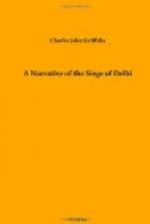The last two days of August we had several men killed and wounded in the force, and one of our officers, who shared my tent after poor Gabbett’s death, received a severe contusion from the bursting of a shell.
Nearly three months had now elapsed since the Siege of Delhi began. We were, to all appearance, no nearer to the desired end, and had scarcely gained one foot of ground nearer to the walls of the city. Moreover, there was alarm in the Punjab owing to a reported disaffection among the Sikh population, who, it is said, were beginning openly to assert that the British army was unable to take Delhi. To check this feeling, the Chief Commissioner had urged General Wilson to lose no time in making preparations for the assault of the city; and thus our expectations beat high at the near approach of the powerful siege-train on its way down from Ferozepore, though we knew there were still before us trials and dangers to which our former experiences would be as nothing.
The weather had now somewhat cleared, but the heat was overpowering, averaging 98 deg. in the shade of my tent every day. Cholera, too, raged as before, the principal sufferers being ourselves, and the 8th and 52nd Regiments. To cheer the soldiers, the bands played in camp of an evening, while some officers and men engaged in sport of various kinds; but the angel of Death was hovering over my poor regiment, and few of us had the heart to join in pastime while our comrades lay stricken and dying of disease in hospital.
September 1.—A portion of my corps was on duty at the Metcalfe stable picket on September 1, when a lamentable loss was experienced, unparalleled in the annals of the siege. The enemy’s battery across the river had never ceased shelling these pickets, though up to this day it had not caused much damage to the defenders.
Shortly after sunrise the men were assembled outside, receiving their grog, which was served out to them every morning at an early hour. Some 100 men and officers, beside Sikhs and native attendants, were grouped around, when a loud hissing sound was heard, and a shrapnel shell, fired from the enemy’s battery at the long range of 2,000 yards, exploded a few feet in front.
The bullets scattered around, and the scene which followed it is almost impossible for me to depict. Many threw themselves flat on the ground, falling one on top of the other, while groans and cries were heard. One soldier fell mortally wounded by my side, and on looking around to count up our losses, we found that two of my regiment had been killed outright, besides six others severely wounded. Two Sikhs and a bhisti, or water-carrier, also met their death, and two doolie-bearers were wounded—thirteen men in all.
One very stout old officer was in the act of having his morning bath when the shell exploded, the bhisti standing at his side and pouring over him, when squatted on a tent-mallet, his massuck of water. He rolled over and over on the ground, presenting such a ludicrous appearance in his wet, nude state, and covered with earth, that, notwithstanding the awful surroundings of the scene, I and others could not forbear laughing. The shot had been quite a chance one, but it proved how deadly was the effect of a shrapnel shell exploding, as this had done, only a few feet in front of a large body of men.




